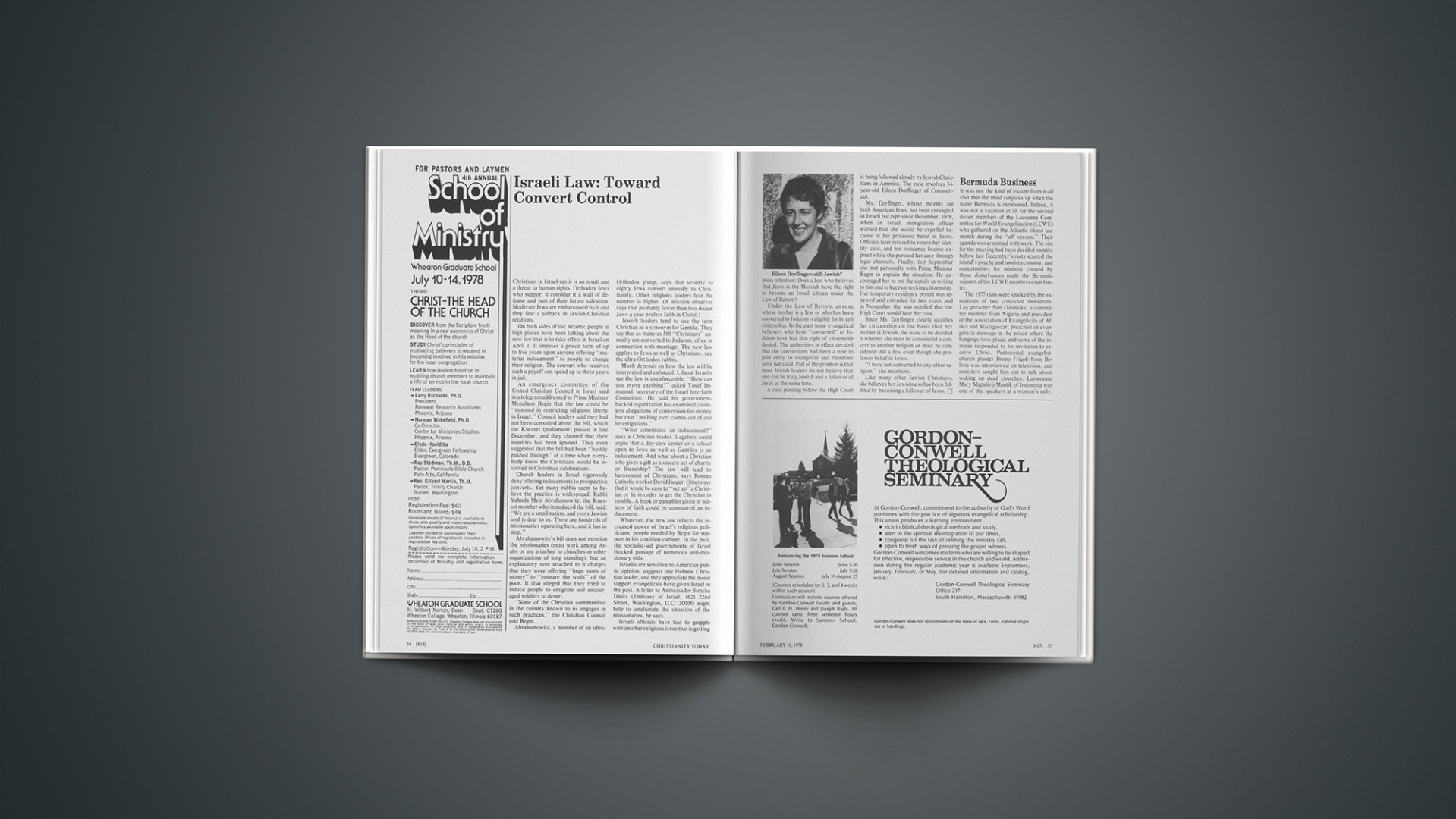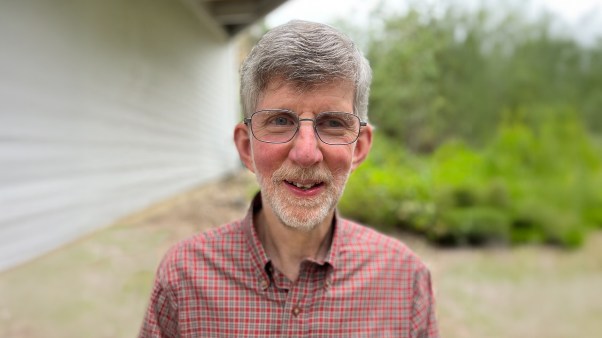Christians in Israel say it is an insult and a threat to human rights. Orthodox Jews who support it consider it a wall of defense and part of their future salvation. Moderate Jews are embarrassed by it and they fear a setback in Jewish-Christian relations.
On both sides of the Atlantic people in high places have been talking about the new law that is to take effect in Israel on April 1. It imposes a prison term of up to five years upon anyone offering “material inducement” to people to change their religion. The convert who receives such a payoff can spend up to three years in jail.
An emergency committee of the United Christian Council in Israel said in a telegram addressed to Prime Minister Menahem Begin that the law could be “misused in restricting religious liberty in Israel.” Council leaders said they had not been consulted about the bill, which the Knesset (parliament) passed in late December, and they claimed that their inquiries had been ignored. They even suggested that the bill had been “hastily pushed through” at a time when everybody knew the Christians would be involved in Christmas celebrations.
Church leaders in Israel vigorously deny offering inducements to prospective converts. Yet many rabbis seem to believe the practice is widespread. Rabbi Yehuda Meir Abrahamowitz, the Knesset member who introduced the bill, said: “We are a small nation, and every Jewish soul is dear to us. There are hundreds of missionaries operating here, and it has to stop.”
Abrahamowitz’s bill does not mention the missionaries (most work among Arabs or are attached to churches or other organizations of long standing), but an explanatory note attached to it charges that they were offering “huge sums of money” to “ensnare the souls” of the poor. It also alleged that they tried to induce people to emigrate and encouraged soldiers to desert.
“None of the Christian communities in the country known to us engages in such practices,” the Christian Council told Begin.
Abrahamowitz, a member of an ultra-Orthodox group, says that seventy to eighty Jews convert annually to Christianity. Other religious leaders fear the number is higher. (A mission observer says that probably fewer than two dozen Jews a year profess faith in Christ.)
Jewish leaders tend to use the term Christian as a synonym for Gentile. They say that as many as 500 “Christians” annually are converted to Judaism, often in connection with marriage. The new law applies to Jews as well as Christians, say the ultra-Orthodox rabbis.
Much depends on how the law will be interpreted and enforced. Liberal Israelis say the law is unenforceable. “How can you prove anything?” asked Yosef Immanuel, secretary of the Israel Interfaith Committee. He said his government-backed organization has examined countless allegations of conversion-for-money but that “nothing ever comes out of our investigations.”
“What constitutes an inducement?” asks a Christian leader. Legalists could argue that a day-care center or a school open to Jews as well as Gentiles is an inducement. And what about a Christian who gives a gift as a sincere act of charity or friendship? The law will lead to harassment of Christians, says Roman Catholic worker David Jaeger. Others say that it would be easy to “set up” a Christian or lie in order to get the Christian in trouble. A book or pamphlet given in witness of faith could be considered an inducement.
Whatever, the new law reflects the increased power of Israel’s religious politicians, people needed by Begin for support in his coalition cabinet. In the past, the socialist-led governments of Israel blocked passage of numerous anti-missionary bills.
Israelis are sensitive to American public opinion, suggests one Hebrew Christian leader, and they appreciate the moral support evangelicals have given Israel in the past. A letter to Ambassador Simcha Dinitz (Embassy of Israel, 1621 22nd Street, Washington, D.C. 20008) might help to ameliorate the situation of the missionaries, he says.
Israeli officials have had to grapple with another religious issue that is getting press attention: Does a Jew who believes that Jesus is the Messiah have the right to become an Israeli citizen under the Law of Return?
Under the Law of Return, anyone whose mother is a Jew or who has been converted to Judaism is eligible for Israeli citizenship. In the past some evangelical believers who have “converted” to Judaism have had that right of citizenship denied. The authorities in effect decided that the conversions had been a ruse to gain entry to evangelize and therefore were not valid. Part of the problem is that most Jewish leaders do not believe that one can be truly Jewish and a follower of Jesus at the same time.
A case pending before the High Courtis being followed closely by Jewish Christians in America. The case involves 34-year-old Eileen Dorflinger of Connecticut.
Ms. Dorflinger, whose parents are both American Jews, has been entangled in Israeli red tape since December, 1976, when an Israeli immigration officer warned that she would be expelled because of her professed belief in Jesus. Officials later refused to return her identity card, and her residency license expired while she pursued her case through legal channels. Finally, last September she met personally with Prime Minister Begin to explain the situation. He encouraged her to put the details in writing to him and to keep on seeking citizenship. Her temporary residency permit was renewed and extended for two years, and in November she was notified that the High Court would hear her case.
Since Ms. Dorflinger clearly qualifies for citizenship on the basis that her mother is Jewish, the issue to be decided is whether she must be considered a convert to another religion or must be considered still a Jew even though she professes belief in Jesus.
“I have not converted to any other religion,” she maintains.
Like many other Jewish Christians, she believes her Jewishness has been fulfilled by becoming a follower of Jesus.
Bermuda Business
It was not the kind of escape-from-it-all visit that the mind conjures up when the name Bermuda is mentioned. Indeed, it was not a vacation at all for the several dozen members of the Lausanne Committee for World Evangelization (LCWE) who gathered on the Atlantic island last month during the “off season.” Their agenda was crammed with work. The site for the meeting had been decided months before last December’s riots scarred the island’s psyche and tourist economy, and opportunities for ministry created by those disturbances made the Bermuda sojourn of the LCWE members even busier.
The 1977 riots were sparked by the executions of two convicted murderers. Lay preacher Sam Odunaike, a committee member from Nigeria and president of the Association of Evangelicals of Africa and Madagascar, preached an evangelistic message in the prison where the hangings took place, and some of the inmates responded to his invitation to receive Christ. Pentecostal evangelist-church planter Bruno Frigoli from Bolivia was interviewed on television, and ministers sought him out to talk about waking up dead churches. Laywoman Mary Mapalieij-Mantik of Indonesia was one of the speakers at a women’s rally, and a woman came to her later in the week for spiritual help. Preaching invitations came from about thirty churches, and Anglican bishop Jack Dain of Australia found Edwin Leather, the island’s governor, in his congregation. The governor met privately later with some of the committee’s clergymen, and his wife attended a civic leaders’ luncheon addressed by Anglican bishop Festo Kivengere of Uganda. Every member of the panel was a dinner guest in a Bermudan home. The LCWE chairman, evangelist Leighton Ford, ended his stay with an evangelistic meeting in Bermuda’s largest theater.
Although the LCWE members spent more time than might have been expected to make an impact on the tiny British colony (population: about 55,000), they reserved most of their schedule for consideration of worldwide evangelical impact. It had been two years since the full committee met last, and the next meeting will be in 1980. The main item on the crowded agenda was planning for the 1980 Consultation on World Evangelization, which the committee will sponsor as a follow-up to the 1974 Lausanne congress. On a smaller scale than the Lausanne meeting, the consultation is designed to assess progress since 1974, “to seek fresh vision and power for the task Christ has given to his church until he comes,” and to develop strategies for completing the evangelization task. The mandate of the LCWE itself will be up for review at the consultation. Third World sites are being considered for the event, which is scheduled for January, 1980. David Howard, on loan from Inter-Varsity Christian Fellowship, will direct it.
Planning for the future was done against a backdrop of reports on the church situation around the world. Explosive growth in Latin America prompted the LCWE to increase its membership to forty-nine, reserving the new seat for an additional representative from that area. Opposition to the Gospel in many areas led the groups to step up its intercessory prayer program around the world. Concern for those still unreached by the church undergirded a decision by the committee to encourage more projects through its strategy-working unit. The need for better intellectual preparation for the evangelistic task was behind the approval of a series of consultations and publications.
One of the more sensitive issues discussed at the meeting was the LCWE’s relationship with other international bodies. The panel reaffirmed the position that it will cooperate on a functional level with certain organizations (such as the World Evangelical Fellowship), but it ruled out any organic connection. Some of the projects and smaller consultations will be sponsored jointly with other groups. The main 1980 consultation, however, will be under the exclusive control of the LCWE executive committee.
Appreciated
Brevity and a well-worn prayer won accolades for Episcopal clergyman David H. Lewis, Jr., in the Virginia senate. Each senate floor session customarily opens with a prayer by a specially invited clergyman, a different one each time. Lewis asked the Lord to help the senators change the things they could, accept the things they could not change, and be able to discern the difference. “Amen,” he said, and he stepped from the dias. The still-standing senators, some of them endurance veterans of eternally long orations to God, broke with all known tradition and applauded him. The ovation lasted longer than the prayer.
Ford was reelected LCWE chairman, and seminary president Saphir Athual of India was named deputy chairman. The term of Gottfried Osei-Mensah, executive secretary, continues for two more years.
Whether the LCWE continues to exist after 1980 will be one of the topics of the consultation scheduled for that year, but members at the Bermuda meeting seemed to assume that it does have a future. They adopted a constitution (for purposes of being registered in the headquarters nation, Kenya), a document that provides for triennial meetings of the full committee and more frequent sessions of the eleven-member executive committee.
For a week prior to the policy-making meeting some of the LCWE members participated in one of the consultations in the series it is sponsoring. “Gospel and Culture” was the subject, and some of the top thinkers in the missiology field were among the thirty-three leaders who attended. Anglican scholar John Stott of London was chairman and the drafter of the final report. Participants “agreed” to commend the document to the churches for study, but none was asked to sign it.
Entitled the Willowbank Report (for the conference center where the consultation was held), the paper is one of a projected series to be published as “Lausanne Occasional Papers.” It urges churches to “contextualize” the Gospel in order to share it effectively in their own culture. While noting that many evangelicals have “been too negative towards culture” in the past, the document calls for caution as Christians seek to put the message in the proper context. It identifies the communication of the Gospel as “the very heart of our concern.”
God’s Word was intended “for ordinary people,” the report states, but “no Christian witness can hope to communicate the Gospel if he or she ignores the cultural factor.” The paper acknowledges that even the most culturally perfect communication sometimes will not produce evangelistic results and that the Holy Spirit often uses imperfect witnesses. The missionary is urged to be humble in work, patiently trusting God to bring about the harvest.
If missionaries to North America’s Navajo Indians 100 years ago would have had access to the Willowbank Report’s theories, that tribe would be substantially evangelized now, commented Peter Wagner of the Fuller Seminary School of World Mission. Meanwhile, it was announced to the LCWE that a South American tribe, the Aymaras, has caught the vision and is planning a missionary thrust onto North American reservations.
ARTHUR H. MATTHEWS
Transition In Angola
The following report was written by a special correspondent with close ties to Angola.
“Twenty years from now we expect no churches to exist in Angola,” declared Marxist-Leninist Angola president Agostinho Neto on May 22, 1977.
In mid-January, eight months after Neto’s dark words, the Roman Catholic bishops of Angola, beginning to feel the heat, publicly protested “the virtual disappearance of freedom of speech and religious tolerance in the country.”
In his May speech last year to a large public assembly, the Moscow-oriented Neto laid down Marxist ideological guidelines for the country and for the formation of an all-powerful, elitist ruling party (the MPLA), as decreed by Lenin. (The widely heralded First Party Congress, originally set for this past September had to be postponed until December. The delay was attributed mostly to a lethal revolt by an anti-Neto faction within the party itself last May 27 that shook the party and country violently. It was primarily the Cubans who saved Neto’s cause. Said Neto at the time: “No party member can be a church member, and no church member can be a member of the party.”)
However, Neto, who worked with great determination against the Portuguese for over nineteen years before seizing presidential power, is a pragmatist willing to work gradually to transform Angola into a full-fledged Marxist state, according to a veteran observer of Angolan affairs. The ruler constantly points out that “this is a period of transition to scientific socialism.” The transition, though, has been slowed by the remnants of anti-government forces from the recent civil war. They are scattered throughout the vast Angola bush.
Although he is supported in power by Cuban might and Russian money, Neto so far has permitted a surprising amount of religious freedom in the transition. Accordingly, Angola churches are free to function openly, except for restrictions associated with military dangers, such as the continued bush fighting. The churches are full on Sundays, with baptisms numbering—as usual in Africa—in the hundreds at a time. Church leaders are free to travel and carry on denominational conferences. Bibles are being sold widely. Several Christians have even gone outside Angola seeking church help and training. Both the Angola Association of Evangelicals (AAE) and its government-preferred, WCC-backed rival, the Angola National Council of Churches (ANCC), are free to function. (The AAE, established in 1974, represents 60 per cent of the Protestants in Angola, while the ANCC, begun in 1976, represents 40 per cent. The majority of Angola’s 6.4 million population are said to adhere to tribal religions, while 40 per cent—mostly Catholics—profess Christianity.)
Even foreign missionaries have been allowed in Angola. Some forty Swiss, Canadian, and American missionaries were in Angola as of last month and more are hoping to enter. But there are risks. In mid-January, 1978, a Swiss missionary nurse was kidnapped by anti-government forces presumably to make use of her medical services and to demonstrate their control of the countryside. Most of the missionaries therefore live and work in the Cuban-controlled cities and towns built by the Portuguese near the coast. All rural mission stations built in the interior since the first Protestant missionaries entered Angola in 1881 (following David Livingstone’s arrival in 1854) have been totally sacked and destroyed by the MPLA-Cuban forces.
The Mobile Word
The Bible on wheels? Well, sort of. The American Bible Society has asked its regional offices in some of the nation’s biggest cities to study the feasibility of placing Scripture portions in taxicabs across the country. A pilot project is already under way in Asheville, North Carolina. It is the brainchild of Allergist Claude A. Frazier. The idea hit him when he was riding a Chicago cab more than a year ago and spotted a Bible lying on the seat beside the driver. He contacted the Bible society and drummed up support for his vision. Local church groups agreed to fund the Bible booklets in Asheville cabs. A number of cab owners and dispatchers have commented favorably on the project, and they are stocking the booklets in their taxis.
“People read newspapers in cabs,” says Frazier. “Why shouldn’t they read the Bible?”
He seems unperturbed by preliminary soundings that the idea will not catch on in the bigger cities. The problems and the needs of people are the same everywhere, he says. If there is a Scripture booklet in the cab, someone will read it, he affirms.
With so much freedom, what are the Catholic bishops so concerned about? Said the Angolan bishops: “Roman Catholics have suffered discrimination for their beliefs and now fear the effects of the systematic propaganda by the authorities in favor of atheism.” Among other things, they cited:
• Pressures in the factory and workshop against any “worker”—the theoretical basic building-block of a Marxist-Leninist state—who is religious.
• The abolition of all religious holidays (there were six Catholic public holidays in Angola under the Portuguese). December 25, now a secularized holiday that is called “Day of the Family,” is the only one still intact.
• The government’s monopoly on the distribution of essential food (half the country’s food requirements must be imported).
• The ceaseless barrage of atheistic propaganda through the state-controlled radio and mass media.
• Indoctrination of all school children by Communist-rewritten history and other school textbooks.
Late last month the government closed the Catholic radio station, and the government newspaper attacked the bishops for drawing up a “provocative, insulting, slandering, and reactionary document” attacking the country’s Marxist rule.
Although Catholic fears and discomfort in Angola are well-founded, Protestants so far have not sensed that much difference between the Communists and the former Portuguese colonial regime. Protestants have always “suffered discrimination for their beliefs” under the previous, heavily Catholic Portuguese empire, according to a former missionary. Nevertheless, most Protestant leaders are expecting the worst as Neto gets deeper into “the transition.”
McIntire a Winner
Separatist leader Carl McIntire last month won a court battle against Cape May, New Jersey, officials who had attempted to collect taxes on his beachfront Bible conference facilities. State tax-appeals judge Carmine F. Savino, Jr., ruled that the Christian Admiral Hotel and its property were exempt from real-estate taxes. The city had billed McIntire for nearly $200,000 in taxes and interest.
Judge Savino moved immediately to hear another McIntire appeal, one involving more than $350,000 in taxes and interest levied against the modern structure in Cape May that had been intended to house the library and offices of Shelton College. McIntire relocated the college in Florida years ago after a hassle with New Jersey authorities over accreditation, and the building has been vacant most of the time since then. Savino was expected to rule on the case this month.
The judge said that his opinion in the Christian Admiral matter was based on several findings: gift-shop sales and fees for room and board were not made for profit; the building was devoted to religious purposes; the life style of McIntire and others gave no indication that funds were used for any purpose than the spread of their Christian beliefs; and McIntire and his followers are “God-fearing, hard-working members of society completely devoted to the fundamental Protestant work ethic that places moral enhancement above material gains.
The city indicated it would appeal the ruling to the state’s Supreme Court. Meanwhile, Charles W. Sandman, Jr., a former congressman who is one of McIntire’s attorneys, was quoted in press accounts as saying that his client would drop his appeals on four other Cape May properties, including the Windsor and Congress Hall hotels.
Contributions
Contributions to ten major U.S. denominations surveyed by the National Council of Churches out-paced inflation in 1976, the latest year for which figures are available. The denominations 1The ten: American Baptist Churches, American Lutheran Church, Christian Church (Disciples of Christ), Episcopal Church. Lutheran Church in America, Presbyterian Church in the U.S. (Southern), United Church of Christ, United Methodist Church, United Presbyterian Church, Lutheran Church-Missouri Synod. reported total contributions of $3.67 billion, an increase of 7.1 per cent over the $3.42 billion reported in 1975. Inflation that same period crept along at 6 per cent. The increase came despite a net loss in membership of more than 200,000, according to the NCC.
In studies of forty-three denominations, the NCC found that the average church member gave $149.75 to the church in 1976, up from $138.54 in 1975.
Of each dollar contributed in 1976, twenty-one cents was earmarked by congregations for mission work or other spending outside the local church, down by about a penny from 1975.
In Canada, twenty-five Canadian denominations or units of U.S. denominations reported total giving of $276 million in 1976, with a per capita gift of $131.50, up from $255.1 million and per capita giving of $118.34 in 1975.
Name Change
The National Prohibition Party is no more—at least for a while. To get away from its image as a single-issue group, it is changing its name on a limited, experimental basis, according to party leader Earl F. Dodge. Its new name, the National Statesmen Party, won over Good Government Party and Family Protection Party in a poll of more than 200 of the party’s faithful.
Dodge laments the single-issue image that has kept many people from taking the party seriously. He says the party’s principles have not changed: the group still favors the eventual prohibition of the manufacture and sale of alcoholic beverages, for example. It will take many years for that to happen, says Dodge, but meanwhile there are other things to emphasize, such as right-to-work laws and tax reform. The party, he said, favors “the maximum amount of individual freedom possible.”
The Prohibition Party, founded in 1868, reached its zenith in 1892, when its presidential candidate—Civil War general John Birdwell—got 271,000 votes. In the early 1900s, the party elected several congressmen, a few governors, and a large number of local officials. It was considered part of the nation’s progressive movement then.
Dodge said the party “was the first to advocate women’s suffrage, child labor laws, and direct election of senators.”
Religion in Transit
Thirty-three years ago United Methodist clergyman Joe Andrews was one of 9,117 Army chaplains on active duty during World War II. He retired at the end of January, and the Army gave a banquet to mark the occasion. He was the last of the Army chaplains who served during that war.
As expected, a review committee of the Lutheran Church-Missouri Synod recommended that the LCMS publish its own version of the proposed Inter-Lutheran Book of Worship hymnal, thereby cutting still another tie to other Lutheran bodies. Although the LCMS had been a partner in drawing up the proposed joint hymnal and had succeeded in getting some of its viewpoints reflected in the book, latter-day conservatives decided the changes weren’t far-reaching enough.
Southern Baptist Seminary in Louisville has become perhaps the first accredited seminary in the nation to offer the Ph.D. degree in evangelism
Personalia
Anthropology professor James O. Buswell III of Wheaton College was elected president of the American Scientific Affiliation, an evangelical organization of scholarly persons active in the fields of science.
Indiana industrialist J. Irwin Miller, a lay leader in the Christian Church (Disciples of Christ), was named recipient of this year’s special Religion in American Life award. It is given annually to “a captain of industry who expresses his religious faith through public service.” Miller was the first layman to serve as president of the National Council of Churches. He served on the Central Committee of the World Council of Churches for eight years. He has also been active in United Nations work.
Poul Hartling, 63, the new United Nations High Commissioner for Refugees, is an ordained minister of the Church of Denmark (Lutheran). An active Christian since his youth, he served several churches as pastor and taught seminary before becoming involved in politics. From 1973 to 1975 he was Denmark’s Prime Minister.
World Scene
Twelve persons, including five missionaries with Overseas Missionary Fellowship and five of their children, along with two other children of missionaries, were killed last month when a mini-bus from OMF’s 150-bed Manorom Christian Hospital in Thailand collided with a truck. The dead included two surgeons. An obstetrician and a child were critically injured. All were from Europe, Australia, or New Zealand.
Evangelist Abraham Kandjibi of the Evangelical Lutheran Ovambokavango Church in South-West Africa (Namibia), the father of ten, was shot and killed, apparently by guerrillas.
A feature-length documentary motion picture based on the life and works of the late British scholar-author C. S. Lewis is being produced this year by the Lord and King firm of suburban Chicago.
The merger of Britain’s United Reformed Church and the Churches of Christ is off. Fewer than the necessary two-thirds of the congregations of the Churches of Christ approved the merger plan. The URC has about 175,000 members, and the COC has approximately 4,000.
Depreciation of the U.S. dollar and West German mark will lead to an estimated deficit of $2.5 million in the 1978 $14 million budget of the World Council of Churches, according to WCC projections.
Worldwide Lutheran membership stands at 70.4 million people, studies show.
Church and secular relief officials are warning that the Sahel region of Africa, devastated several years ago by drought and famine in which tens of thousands died, is facing a similar crisis this year.
Deaths
WILLIAM BARCLAY, 70, Church of Scotland clergyman and theological educator, world-renown Bible scholar, and author of The Daily Study Bible; in Glasgow, Scotland, after suffering for months from Parkinson’s disease.
CECIL A. KETTLE, 68, founding director and former president of Christian Nationals’ Evangelism Commission, an early advocate of “national-to-national” outreach; in Santa Cruz, California, after a long illness.
Calm has returned to Briansk in the Soviet Union. The legally recognized Baptist congregation there had moved in September into a building its members had constructed without a building permit across the street from a monument to Lenin. Police evicted the worshippers in a scuffle that resulted in a number of reported injuries and international press coverage. Through negotiations with denominational and government officials, the congregation recently purchased a building described as comfortable and accessible, and services are now being held there.
The future of missionary work in Bangladesh, a nation of 83 million, is uncertain. Visas of older missionaries are not being renewed, and government officials say they want to phase out all Protestant workers eventually. One edict called for everyone to be out this year, but under diplomatic pressure the order was withdrawn, according to mission sources.
The Roman Catholic, Anglican, Presbyterian, Methodist, and Evangelical churches of Ghana last month announced their reciprocal recognition of Christian baptism. Baptism will not have to be repeated if administered in accord with the “rightful forms” of Christ’s command, said a joint statement. The statement also said that the church bodies will seek to work toward unity in all sectors of church life and doctrine.
Operation Mobilization now has a second ship, an older but larger vessel than the Logos, known in ports from Europe to the Far East for its book exhibits (and gospel outreach). The new acquisition has been rechristened Doulos (Greek for “servant”).
Erratum
A typographical error in the January 27 issue resulted in the misspelling of the name of Walter Kaiser, former president of the Evangelical Theological Society.









